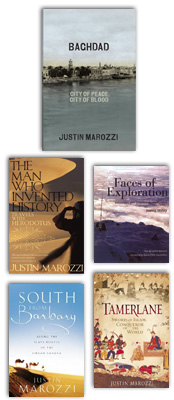When King Abdullah first started work on this political memoir two years ago, he can hardly have imagined how different the Middle East would look by the time of its publication. Change in this region, which prizes stability above all else, mostly occurs at a glacial pace, if it happens at all. Yet the region has been turned upside down so quickly, with the popular revolutions that began in Tunisia and Egypt, that one can reasonably wonder what other surprises may lie in store before this review is published. Change is no longer a political slogan voiced by a distant American president. It’s real. It’s happening now. Tunis and Cairo have proved to be only the start. Stability, all of a sudden, doesn’t look so stable.
If any family in the world can be said to represent stability, it is the Hashemite monarchy of Jordan. King Abdullah is a 43rd-generation direct descendant of the Prophet Mohammed. In the sixth century, his ancestor Qusai was the first ruler of Mecca. In the past few days, however, cracks have started appearing. On 8 February, a group of 36 tribal leaders, the traditional cornerstone of the monarchy, warned that, ‘Jordan will sooner or later be the target of an uprising similar to the ones in Tunisia and Egypt due to suppression of freedoms and looting of public funds.’ The virtually unprecedented criticism also broke an important taboo by linking Queen Rania to corruption. Crowds have taken to the streets. The king has sacked his government.
The title of this engrossing book refers to the pressing need, as King Abdullah sees it, for Israelis and the Palestinians to make peace. Substitute ‘reform’ for ‘peace’ and it would be even more timely. As toxic as the Israel-Palestine question undoubtedly is for the region, the West is starting to discover that a policy of supporting dictatorships while preaching democracy carries dangers of its own.
This is a book that avowedly mixes the personal with the political. Cyclical conflicts in the Middle East have taken their toll on the Hashemite family. In 1951, the present king’s great-grandfather, King Abdullah I, was assassinated by a Palestinian gunman belonging to the militant group, Jihad Muqaddas. According to t his account, there were 18 documented assassination attempts — all unsuccessful — against Abdullah II’s father, the late King Hussein, between the time of his accession to the throne at 18 and his 30th birthday.
Educated in Jordan, England and America, Abdullah represents a thoughtful, moderate blend of East and West. His role model, above all, is his father, who took serial risks for peace. He describes how, as a captain in the Jordanian army, following a punishing but defining stint at Sandhurst, he once accompanied King Hussein on a secret mission into Israel to discuss a peace proposal, entering the country on a 33-foot fishing boat under cover of night. A former director of Jordanian Special Forces, he takes particular relish in describing the hunt for Abu Musab al Zarqawi, the al- Qa’eda leader who in 2005 perpetrated ‘Jordan’s 9/11’, in which three suicide attackers killed 60 in Amman.
Today, Abdullah continues the diplomatic push for peace, acutely aware of how prospects for a lasting two-state solution are receding with every new settlement Israel erects and every new terrorist attack. ‘One of the best weapons against violent extremists is to undercut their rallying cries,’ he writes. The best hope yet, as Abdullah argues, remains the Arab Peace Initiative of 2002 — encompassing a full Israeli withdrawal to June 1967 boundaries, a just solution to the refugee question and the establishment of an independent Palestinian state with East Jerusalem as its capital, in return for peace with all Arab states. He sums up the stark choice facing Tel Aviv as ‘Fortress Israel or a Fifty-Seven State Solution’.
It now looks as if Israel may yet find itself with even fewer friends in the Middle East, ruing the failure to strike the sort of peace deal advocated by Abdullah and his late father. As for Abdullah’s own future in a newly uncertain political climate, a line jumps out. He writes how he and his four brothers say they are like five fingers on a hand. ‘If you are well-meaning, we extend the hand of friendship; but when outsiders try to harm the family, we band together and become a fist.’

